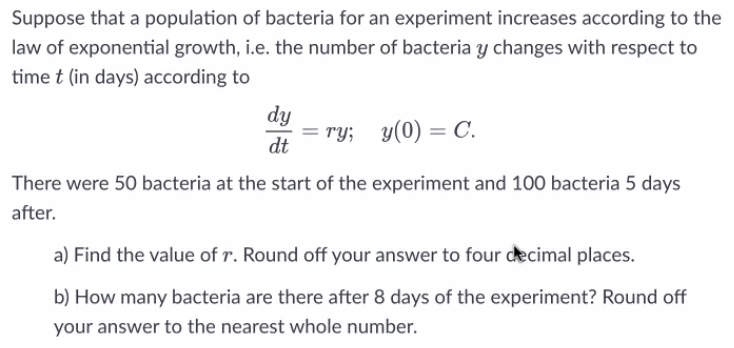Suppose that a population of bacteria for an experiment increases according to the law of exponential growth, i.e. the number of bacteria y changes with respect to time t (in days) according to dy = ry; y(0) = C dt There were 50 bacteria at the start of the experiment and 100 bacteria 5 days after. a) Find the value of r. Round off your answer to four decimal places. b) How many bacteria are there after 8 days of the experiment? Round off your answer to the nearest whole number.
Suppose that a population of bacteria for an experiment increases according to the law of exponential growth, i.e. the number of bacteria y changes with respect to time t (in days) according to dy = ry; y(0) = C dt There were 50 bacteria at the start of the experiment and 100 bacteria 5 days after. a) Find the value of r. Round off your answer to four decimal places. b) How many bacteria are there after 8 days of the experiment? Round off your answer to the nearest whole number.
Related questions
Question

Transcribed Image Text:Suppose that a population of bacteria for an experiment increases according to the
law of exponential growth, i.e. the number of bacteria y changes with respect to
time t (in days) according to
dy
= ry; y(0) = C
dt
There were 50 bacteria at the start of the experiment and 100 bacteria 5 days
after.
a) Find the value of r. Round off your answer to four decimal places.
b) How many bacteria are there after 8 days of the experiment? Round off
your answer to the nearest whole number.
Expert Solution
This question has been solved!
Explore an expertly crafted, step-by-step solution for a thorough understanding of key concepts.
Step by step
Solved in 2 steps with 2 images
